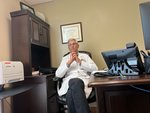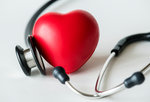Wind: mph,
Welcome to our new web site!
To give our readers a chance to experience all that our new website has to offer, we have made all content freely avaiable, through October 1, 2018.
During this time, print and digital subscribers will not need to log in to view our stories or e-editions.


MountainView Regional Medical Center’s cardiothoracic surgeon Dr. Charles Dow said awareness is growing in communities and medical offices about heart health and coronary disease. The recognition that the presentation of heart problems is not only the typical known symptoms but can have other warning symptoms that need to be taken seriously.
“Because the typical symptoms of coronary disease, which is blockage of the arteries of the heart, in a woman may be different than a man,” he said. “A woman may not complain of the classic chest pain down your arm which is not necessarily that common. They may come in and complain of fatigue or shortness of breath maybe a pressure sensation or maybe just feeling a little bit different. Now clinical providers are realizing they may have heart disease.”
Dow said maybe treatments haven’t changed much but the process of best medical therapy has changed.
“I think the awareness and the prescription to instruct patients to take care of themselves better has made some dramatic effects on care and is hopefully decreasing the incidence of heart disease,” he said. “But it’s still there, still the number one (killer of men and women in the United States).”
Dow said lifestyle changes can make all the difference and there are things individuals can control. He said the old adage “you are what you eat” is a big part of it, but there are others.
“We have learned stress plays a big role in heart disease,” Dow said. “(things people can take care of include) the cessation of smoking; managing diabetes better; getting on the right medications to control blood pressure; taking charge of your health care; checking blood pressure, making sure it’s not high all the time.”
Dow said while all these things have helped prevent patients from suffering the ill effects of coronary disease, each one can make a difference by itself.
“If you take one thing out of this, stop smoking and you have just decreased your risk by a lot,” he said. “If you don’t smoke and you say, ‘I’m going to try and eat better three times a week or walk 30-40 minutes three times a week or even just 20 minutes,’ you have improved your heart health. Take one thing and say I’m going to focus on one thing at a time.
“What we can’t do is change our genetic predisposition, but you can get close through management. Follow up; there are a lot of things we can do to control heart disease.”
Dr. Craig Cannon and nurse practitioner (DNP)Kimberly Miller work at the heart clinic at MountainView where they see about 50 patients a day. They must look at the patients referred to them, decide which ones are actually heart patients and determine a course of actions for each.
Miller said heart disease is prevalent in this area where there is a lot of diabetes and other related things that lead to heart disease.
“We have a lot of disparity – poor diet, obesity – we are pretty packed (at the clinic) most of the time. It’s a very busy business. Get potential problems treated early. If you leave it alone, you end up with heart failure and things that are very difficult to treat.”
“Fifty percent of Americans will die of heart disease,” Cannon said. “But there is a lot you can do on your own to help. Stay active and exercise, restrict your diet. Most heart disease is preventable.”